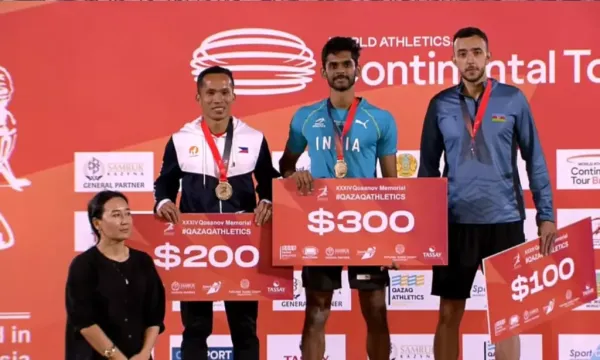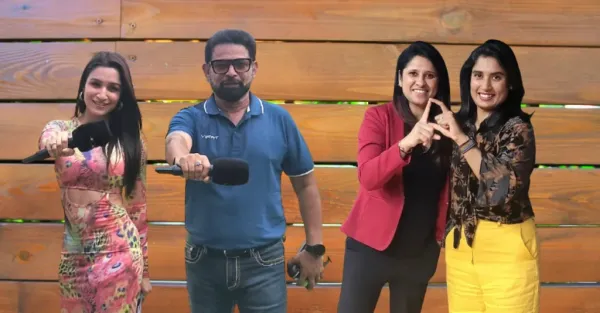Vilnius: When it comes to punching above one's weight, there isn't anyone quite like Superman - whether he's the one the Nazis hated and dismissed as 'poison,' or the recent David Corenswet-starring version. Jerry Siegel, who co-created Superman in 1938, had origins in Lithuania. Siegel's parents - his father's family name was Segalovich - had fled antisemitism in the Baltic nation, then part of the Russian empire, for New York in 1900. Since those days, Lithuania has become quite a nation with a mean (largely American) pop cultural punch.
Take Al Jolson, most famous for uttering the first line in cinema - 'You ain't heard nothin' yet!' - in the 1927 talkie, The Jazz Singer. His 'blackface,' daring enough in that era, made many believe Jolson, born Asa Yoelson in Seredžius, a small Lithuanian town, was African American.
More recently, a fictional member of Lithuanian and Italian noble descent, in Thomas Harris' The Silence of the Lambs, has captivated viewers by 'having an old friend for dinner': Hannibal Lecter.
Unlike the cannibalistic serial killer and former forensic psychiatrist Lecter, I was having far more conventional potato pancakes with sour cream for dinner in Lithuanian capital Vilnius' picturesque old town. This was after admiring - and digesting - St Ann's Church, which Napoleon Bonaparte, marching towards Moscow in 1812, had wanted to carry back as spoils of war to Paris.
Laughing at my quoting Lecter's 'I ate his liver with Chianti wine' line, chocolate and confectionary manufacturer Pergale chairman Rolandas Janceris suggested that alternatives were liquor chocolates. There was champagne in one and Janceris was looking at pink gin fillings in their chocolate in the future.
'We've had the police here,' Janceris told me, 'asking, 'Can liquor chocolate get you drunk?' 'Yes,' he had chuckled, 'but only if you've had 3 kilograms of our stuff.' The Pergale boss insists on using robots for his assembly line - 'They're not tempted. They don't eat any chocolate!'
Trampled by Hitler, devoured by Stalin, 'little' Lithuania, now 3 million people strong, reached out towards Anglo-American cultural traditions. At Vilkija, 100 km from Vilnius, I am at Louis Armstrong Park. The Great Satchmo wasn't Lithuanian, of course. But his benefactor, Ziskind Karnofsky had moved with his wife Toby to New Orleans in the early 1990s. Father of 10, they found a place in their hearts for a poor, talented boy, and realised the dream of the future trumpeter and jazz legend.
Further down the road at the village of GelgaudiSkis, lived the ancestors of one of the most 'English' of actors: John Gielgud, his father side being of Lithuanian-Polish descent, and his surname deriving from this village in southwest Lithuania. Most Indians will remember Gielgud famously as the imperial Lord Irwin, viceroy of British India, looking down his luxuriant nose at Mohandas Gandhi in the 1982 Richard Attenborough film.
Then, there's the Mahatma himself. At Rusne, a 14th c. town famous for smoked trout, Lithuanians celebrate Gandhi. Every summer, the locals march to the riverside statue of the Indian and local boy Hermann Kallenbach to lay wreaths. When Gandhi was in South Africa, it was Kallenbach, a wealthy architect, who worked to build Tolstoy Farm, the ashram established near Johannesburg in 1910, which served as the centre for satyagraha against racial discrimination in Transvaal.
There's always talk about how close Sanskrit and Lithuanian are. But the really 'big' surprise comes from Tomas Zdanavicius, the 29-yr-old 6 ft 8 in basketball player, who's a devotee of another apostle of non-violence from the subcontinent, the Dalai Lama. 'All wars can be decided on a basketball court,' Tomas tells me. But there's a sharp edge during games with Russia, Lithuania having been (unwillingly) part of the Soviet Union from 1939 to 1991.
Among the picnickers at GelgaudiSkis, I could see a proud family watching a little child on her first day out. A teddy bear twice her size next to her, she sat on a baby rocking horse, laughing away, utterly delighted. Much like 'little' Lithuania, with another giant bear casting its shadow next to her and her Baltic sisters Latvia and Estonia.
Take Al Jolson, most famous for uttering the first line in cinema - 'You ain't heard nothin' yet!' - in the 1927 talkie, The Jazz Singer. His 'blackface,' daring enough in that era, made many believe Jolson, born Asa Yoelson in Seredžius, a small Lithuanian town, was African American.
More recently, a fictional member of Lithuanian and Italian noble descent, in Thomas Harris' The Silence of the Lambs, has captivated viewers by 'having an old friend for dinner': Hannibal Lecter.
Unlike the cannibalistic serial killer and former forensic psychiatrist Lecter, I was having far more conventional potato pancakes with sour cream for dinner in Lithuanian capital Vilnius' picturesque old town. This was after admiring - and digesting - St Ann's Church, which Napoleon Bonaparte, marching towards Moscow in 1812, had wanted to carry back as spoils of war to Paris.
Laughing at my quoting Lecter's 'I ate his liver with Chianti wine' line, chocolate and confectionary manufacturer Pergale chairman Rolandas Janceris suggested that alternatives were liquor chocolates. There was champagne in one and Janceris was looking at pink gin fillings in their chocolate in the future.
'We've had the police here,' Janceris told me, 'asking, 'Can liquor chocolate get you drunk?' 'Yes,' he had chuckled, 'but only if you've had 3 kilograms of our stuff.' The Pergale boss insists on using robots for his assembly line - 'They're not tempted. They don't eat any chocolate!'
Trampled by Hitler, devoured by Stalin, 'little' Lithuania, now 3 million people strong, reached out towards Anglo-American cultural traditions. At Vilkija, 100 km from Vilnius, I am at Louis Armstrong Park. The Great Satchmo wasn't Lithuanian, of course. But his benefactor, Ziskind Karnofsky had moved with his wife Toby to New Orleans in the early 1990s. Father of 10, they found a place in their hearts for a poor, talented boy, and realised the dream of the future trumpeter and jazz legend.
Further down the road at the village of GelgaudiSkis, lived the ancestors of one of the most 'English' of actors: John Gielgud, his father side being of Lithuanian-Polish descent, and his surname deriving from this village in southwest Lithuania. Most Indians will remember Gielgud famously as the imperial Lord Irwin, viceroy of British India, looking down his luxuriant nose at Mohandas Gandhi in the 1982 Richard Attenborough film.
Then, there's the Mahatma himself. At Rusne, a 14th c. town famous for smoked trout, Lithuanians celebrate Gandhi. Every summer, the locals march to the riverside statue of the Indian and local boy Hermann Kallenbach to lay wreaths. When Gandhi was in South Africa, it was Kallenbach, a wealthy architect, who worked to build Tolstoy Farm, the ashram established near Johannesburg in 1910, which served as the centre for satyagraha against racial discrimination in Transvaal.
There's always talk about how close Sanskrit and Lithuanian are. But the really 'big' surprise comes from Tomas Zdanavicius, the 29-yr-old 6 ft 8 in basketball player, who's a devotee of another apostle of non-violence from the subcontinent, the Dalai Lama. 'All wars can be decided on a basketball court,' Tomas tells me. But there's a sharp edge during games with Russia, Lithuania having been (unwillingly) part of the Soviet Union from 1939 to 1991.
Among the picnickers at GelgaudiSkis, I could see a proud family watching a little child on her first day out. A teddy bear twice her size next to her, she sat on a baby rocking horse, laughing away, utterly delighted. Much like 'little' Lithuania, with another giant bear casting its shadow next to her and her Baltic sisters Latvia and Estonia.
(Disclaimer: The opinions expressed in this column are that of the writer. The facts and opinions expressed here do not reflect the views of www.economictimes.com.)









Srinjoy Chowdhury